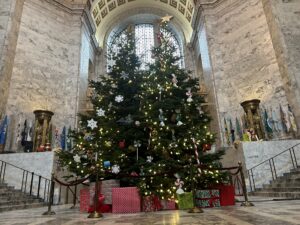
Notes From Olympia: Dec. 14, 2023 Preparing for Legislative Session
This edition summarizes the early learning components included in Governor Inslee’s recently released supplemental budget and a preview of legislative session activity.
 The Legislative Building showing off its winter festive self with the Holiday Tree display. The trees hold 7,000 lights with the theme of “video games.”
The Legislative Building showing off its winter festive self with the Holiday Tree display. The trees hold 7,000 lights with the theme of “video games.”
(Photo Credit: Erica Hallock)
Release of Governor’s Supplemental Budget
On Wednesday, Dec. 13, Governor Jay Inslee released his proposed $70.9 billion supplemental budget. All of the supplemental budget details can be found on the Office of Financial Management’s webpage, including a summary of the budget highlights and the proposed budget bill.
Supplemental budgets are intended to make “tweaks” to biennial budgets to reflect caseload changes or emergent needs and, as a result, do not typically contain significant new investments. The most significant new investments are focused in areas the Governor deems “critical issues,” including housing/homelessness, behavioral health and the fentanyl/opioid crisis. And while revenue has increased, the budget documents note that costs related to providing ongoing services, increasing caseloads and inflation have also grown, making fewer of these additional resources available for new investments.
Early learning highlights include:
- ECEAP Rate Increase. A total increase of $10.2 million to provide a 6% rate increase for school-day slots and a 10% rate increase for working-day slots.
- Transition to Kindergarten (TTK). A total of $1.4 million for Transition to Kindergarten Coordinated Enrollment for DCYF to provide consultation to the Office of the Superintendent of Public Instruction to support connections among TTK programs and local early learning providers.
- Voluntary Home Visiting. A total of $1.6 million to support 150 targeted voluntary home visiting slots for families where substance use disorder may be a risk factor.
- Contracted Child Care Slots. A total of $1.6 million for DCYF to pilot contracted child care slots for child protective services-involved infants.
- Early Achievers Grant Program. A total investment of $2.4 million in Washington Education Investment Act funding to assist child care providers earn a credential in early childhood education. The increased funding is intended to cover recruitment, advising and support activities at community and technical colleges.
Revenue and Caseload Forecasts Released
Revenue Forecast
On Nov. 20, the Washington State Economic and Revenue Forecast Council met to receive the final revenue report from retiring State Economist Dr. Steve Lerch.
Despite slowing revenue collections, revenues do continue to exceed previous projections, with an estimated increase of $191M anticipated for the remainder of the 2023-25 biennium, and an estimated additional $579M for the 2025-27 biennium.
Caseload Forecast
On Nov. 8, the Washington State Caseload Forecast Council met to receive updated caseload projections for entitlement programs. The Caseload Forecast Council also produces narratives discussing potential risks to the forecast. A number of programs impacting early learning and children and families are included in the caseload forecast:
- Working Families Tax Credit. For the first time, the Working Families Tax Credit is included in the caseload forecast and is expected to benefit 20,754 families in State Fiscal Year (SFY) 2024 (the fiscal year we are currently in) and 27,390 families in SFY 2025 (the fiscal year starting July 1, 2024).
- Working Connections Child Care. Working Connections Child Care is expected to serve 28,063 families in SFY 2024, up 1,081 families from the June 2023 forecast, or 4%. The program is expected to grow to serve 30,170 families in SFY 2025, an increase of 386 since June, or 1.3%.
- Transitional Kindergarten. Transitional Kindergarten is expected to serve 4,983 children in SFY 24, up 281 children since June (a 6% increase), followed by serving 5,480 children in SFY 2025, an increase of 425, or 8.5%.
- Early Childhood Education Assistance Program (ECEAP). ECEAP is projected to serve 13,938 children in SFY 2024, down 811 children from the June forecast, or a 5.5% reduction. In SFY 2025, the program is expected to serve 15,025 children, down 1,141 from June, a 7.1% reduction.
The revenue and caseload forecasts were used to inform Governor Inslee’s supplemental budget and updated forecasts developed during the latter part of the legislative session will inform the supplemental budget ultimately adopted by the Legislature.
In short, the revenue forecast signals to decision-makers how much money they have available to spend while the caseload forecasts indicate how much money must be spent on entitlement programs such as K-12, prisons and certain health care programs. Increasing revenue projections can be offset by rising caseload projections (which bring increasing spending commitments).
It’s Beginning to Feel a Lot Like Legislative Session …
Although it may feel as though the 2023 legislative session just ended, the start of the 2024 session is just around the corner. This will be the “short,” 60-day session, running from Jan. 8 through March 7.
Short sessions are full-out sprints with one legislative cutoff after another. At the same time bills are running through their processes, budget writers will be focused on drafting and negotiating a supplemental budget that will make adjustments to the 2023-25 budget the Legislature adopted before they left town last April.
Do not fret! Notes From Olympia will be here to recap all the goings on in Olympia and preview what is to come.
Committee Assembly Days
Each year in late November/early December, Senate and House members gather at the Capitol for “Committee Assembly Days.” These days are meant to provide an opportunity for legislative committees to receive updates on issues of interest via work sessions and allow lawmakers to connect with each other and partners on priorities. These Committee Days are also scheduled right before the fundraising “freeze” for elected officials kicks in, so there are fundraisers in the morning and night.
Committee Days are a bit like the first day of school as folks reacquaint after the legislative interim, but then return home after just a few days. It is also a good test to see if one is “session ready.” Can you find your backpack? Did you unpack said backpack after last session? Did you bring a water bottle? Did you prepare your backpack with breath mints and snacks? (Spoiler alert: the author failed on all counts of this very basic assignment).
Back to the work at hand, the House Appropriations Committee held a work session that included a very helpful overview of 2024 state budget items presented by the House Appropriations Operating Budget Coordinator Mary Munroe. Munroe’s document contains a lot of helpful data about budget components and I plan to hold on to it for reference as session progresses. You can also watch the presentation via TVW beginning at the 1:30 mark.
Finally, a very exciting update. TVW and the state Legislature are partnering to pilot offering picture-in-picture American Sign Language (ASL) interpretation for certain Senate and House legislative hearings. Both TVW and the legislative webpage will denote which hearings will have ASL interpretation.
Prefiled Bills
Beginning the first Monday of December, legislators are able to prefile bills for introduction prior to the start of the legislative session. These prefiled bills are officially introduced on the first day of the legislative session.
Of note for early learning, Senator Andy Billig has introduced SB 5774, which would require DCYF to offer background check fingerprinting in its local offices, to the extent funding is provided.
In addition to releasing weekly Notes From Olympia, Start Early Washington will produce a weekly bill tracker that provides a quick status update on bills. The bill tracker and other resources will be available on our Policy and Advocacy Resources page.
Welcome Zoë!
Zoë Erb (she/her) joined Start Early Washington in November as our Policy & Advocacy Manager, the newest policy-wonk to join the policy team. Passionate about alleviating systemic inequities, she established her career in the nonprofit and higher education sectors; she is excited to learn more about making a difference for families and caregivers in the early learning space.
Prior to working at Start Early Washington, she worked at a nonprofit called Communities Rise that provides capacity building to grassroots/BIPOC-led organizations in Washington. Zoë has spent most of her life in the Evergreen State and looks forward to keeping you in the loop about the goings-on at the state Legislature through the Notes From Olympia.
Here’s her favorite fun fact about Washington: The city name Walla Walla means “place of many waters” in the Nez Perce language (although tourists are often told it comes from being a place “so nice they named it twice”). We are thrilled to have Zoë as a member of our team!
Capitol Campus Construction Update
 (Photo Credit: Erica Hallock)
(Photo Credit: Erica Hallock)
While I was in Olympia for Senate Committee days, I had to check out progress on the replacement of the Irv Newhouse Building. (Note there is a prefiled bill that, if passed, would ensure the new building maintains the Newhouse name).
Construction is impacting a broad area around the Capitol, limiting parking and traditional pedestrian walking paths. Crews continue to make swift progress with an estimated completion date of November 2024.
I went back and checked where construction was at on the last day of the 2023 session and I would say they have come a long way!
About the Author

Erica Hallock
Director, Policy & Advocacy, Start Early Washington
Erica Hallock serves as the Director of Policy and Advocacy for Start Early Washington. She has worked in early childhood, health and human services policy in both California and Washington state.
More Like This
Contact Us
Connect with our team to learn more about our work or discuss how we can support policy and advocacy work for your organization.
Washington State Hub
Learn more about our work in Washington state and access relevant resources and publications.
